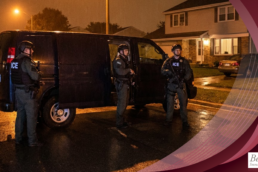The Department of State recently announced a new immigration measure known as the “One-Strike Policy.” Introduced under the leadership of Secretary of State Marco Rubio, this initiative signals a major shift in how the U.S. government treats visa holders who are perceived to violate certain standards of conduct or national security expectations. The policy has already drawn sharp reactions from immigrant communities, universities, and civil liberties advocates across the country.
What is the Policy?
The One-Strike policy allows the U.S. government to revoke visas from foreign nationals after a single incident that is deemed disruptive, threatening, or contrary to American interests. It is being presented as a zero-tolerance approach to what officials call “extremist behavior” or political agitation by non-citizens.
Secretary Rubio explained that the purpose of this policy is to prevent foreign visitors from using their temporary status to engage in activities that go beyond the scope of their visa—especially student visas. According to Rubio, visas are a privilege, not a right, and are intended for work, education, or tourism—not for protest or political activism that risks disrupting public order.
Immediate Enforcement
The policy has already led to the revocation of more than 300 student visas. Some students with minor violations, such as a traffic ticket, have seen their visas terminated, as well as students who have protested Israel’s war in Gaza on college campuses. The administration has also employed artificial intelligence tools to monitor online activity and social media, identifying individuals who may be involved in behavior deemed harmful or subversive. This proactive monitoring raises concerns about privacy, profiling and the potential misuse of surveillance technologies.
Potential Impact
For immigrants and those seeking to enter the United States, the One-Strike Policy introduces a heightened level of risk. International students may face higher scrutiny—not just because of their academic or legal standing, but because of their personal opinions and public expressions. Colleges and universities, which have long benefited from the contributions of international students, are also expressing concern. These institutions may now find it harder to attract foreign students, who could perceive the United States as an increasingly hostile environment.
Immigration experts worry that this could have a chilling effect on free speech and discourage talented individuals from studying or working in the United States. Many fear that the broad and subjective language used to define a ‘strike’ could be applied inconsistently or unfairly.
Broad Shift in Immigration Policy
The One-Strike policy is part of a broader pattern under the current administration that emphasizes national security and ideological conformity over openness and international engagement. It aligns with an “America First” framework that prioritizes control and enforcement over diversity and inclusion. The implementation of this policy could shape the national conversation about who gets to come to the U.S., under what conditions, and with what rights.
What Immigrants and Visa Holders Should Know
While the policy is still evolving, foreign nationals currently in the United States or planning to arrive should remain informed and cautious. Avoiding any actions that might be interpreted as politically disruptive could become a matter of visa survival.
At the same time, immigrant advocacy organizations are pushing back and encouraging individuals to know their rights. Legal challenges may be on the horizon, particularly in cases where the policy appears to violate constitutional protections like freedom of expression.
Conclusion
The One-Strike Policy represents a dramatic turn in U.S. immigration enforcement, especially for students and other temporary visa holders. Whether it strengthens national security or undermines civil liberties is a question that will continue to provoke debate in the months ahead. For now, it is essential for immigrants and their allies to stay alert, informed, and connected with legal and community resources. If you have concerns about your immigration status or believe your rights may be at risk, contact Berardi Immigration Law for guidance and support.
Ready to have Berardi on your side?
Whether you’re a business looking to hire or a professional hoping to relocate, immigration law can be complicated. But you don’t have to do it alone. Put our experience to work for you.



